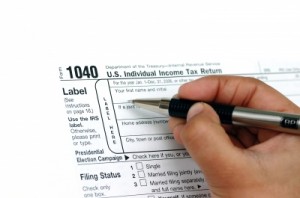I’m a contrarian – that’s something you will probably always be able to say about me, and something you are likely to notice right off the bat. First, I start out telling you it’s okay to throw away food, and now, well, let’s see what anti-conventional wisdom I am coming up with next. But before I go any further, let me just be very clear on a few things: No matter what you think about taxes, whether they are fair or not, or whether you think you should have to pay them, I do not ever advocate paying anything less than all the tax you owe, but I also don’t think you should pay one penny more. Also, if you don’t like taxes, blame Congress, not the IRS. Congress sets the taxes, and the IRS gets the blame. While sometimes IRS methods are draconian, at least you should know that they act at the direction of Congress.
Now, back to the topic: In the current economic climate, there’s really no great reason NOT to loan money to your government (an interest-free loan, by the way) in the guise of a very large tax refund for yourself at the end of the year.
Yes, I know all the conventional wisdom: If your tax return is larger than about $100, you are doing yourself a very bad service, since that’s money you could have put in the bank and earned interest on! And so of course, you should always make sure your tax refund is as small as possible, and not loan money to the government, especially interst-free.
I disagree. Why? Because, as I mentioned previously, in this current economic climate, you aren’t going to gain much advantage by keeping that extra cash in your paycheck for two reasons:
- Interest rates are in the cellar (just in case you didn’t notice), and
- Those “savings” will probably never make it into a savings account anyway
But, really, don’t take my word for it. Let’s look at some interest rates to see what you actually would earn if you put an extra $1,000 in the bank and saved it for a year. Now realize that this $1,000 (which represents the amount of tax refund you could get in this example, if you are over-withholding your tax) is most likely going to be spread out over the year and divided by all your paychecks. So, if you get paid once per month, that $1,000 will be roughly $84.00 per pay period.
I went to several bank websites to get a feel for interest rates (they are pitiful!!) and the best I could come up with in a “high-yield” bank account that isn’t restricted by location or occupation (like most credit unions are) is 0.84% at Ally Bank with no minimums and no maintenance fees. So, we are going to figure the total interest on a series of payments of $84.00 for 12 periods, compounded monthly. Using these figures, at the end of one year, your total amount saved will be $1,012.60. You will have earned an interest amount of $12.60 for the year. Whoopie Doopie!
And if that weren’t bad enough, you know and I know that the $84.00 is likely going to be gone before it ever hits the savings (unless you’re really smart and have it direct-deposited there, which is not a bad idea). But for many people, $84.00 isn’t really enough to make a big difference in their lives, and it would easily and quickly be absorbed into one night out at a good restaurant, a really hot summer electric bill, or one very minor auto repair. In other words, you would never even notice it.
BUT! If you did like many people do, and deliberately overwithheld your taxes directly out of your paycheck, there is actually some advantage to be gained. <=Click to Tweet! At the end of the tax period, usually as early as the middle to end of January, you can get your money back and it will actually be enough that you can use it for something very necessary or very special. And you would have had all year to decide what that would be!
Remember, though: quickie tax services and refund anticipation loans are not your friend. Having owned a tax service in the past, it really bothered me to see people who needed the money so badly, paying it out in bank fees and loan application charges, simply because they just couldn’t wait any longer to get their money back (there is a reason why my ownership of this type of service is in the past, and this is one of the reasons). Most of these people also could have filed their taxes for free, if someone had just told them that the IRS allows most lower-income people to e-file for free on their website. In addition, many of the tax return software companies allow free e-file for all taxpayers on their websites! You just have to know where to look! This is a topic I’ll cover more in the future.
So save smart by having a little extra (or a lot if you can) withheld every pay period, and have significant money to show for it at the end of the tax year!
To Recap:
- If you deliberately overwithheld your taxes directly out of your paycheck, there is actually some advantage to be gained
- You have a whole year to decide how to use this money you saved up – that gives you plenty of time to choose the best use of your newly-saved money
- Don’t be taken in by tax return services that charge exorbitant fees for tax return preparation and refund anticipation loans. Keep that money for yourself!









